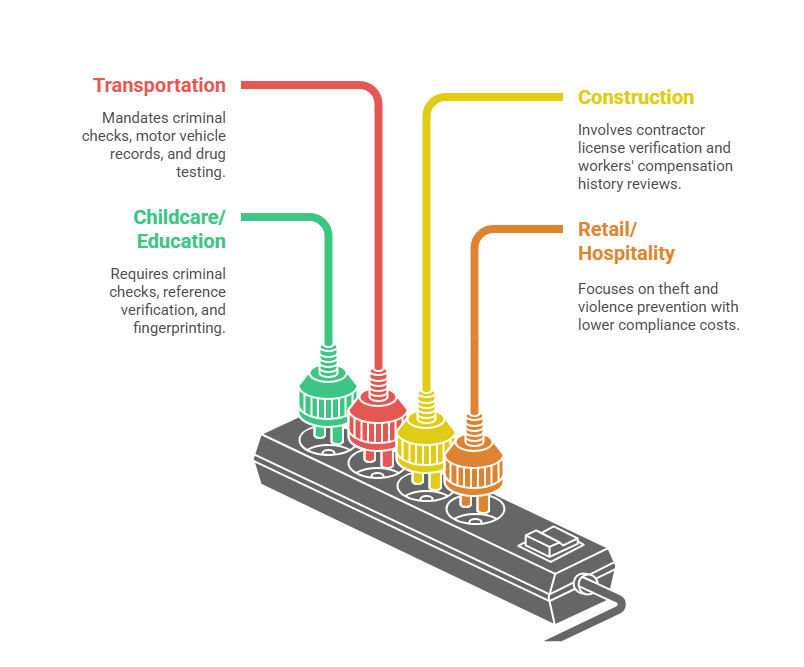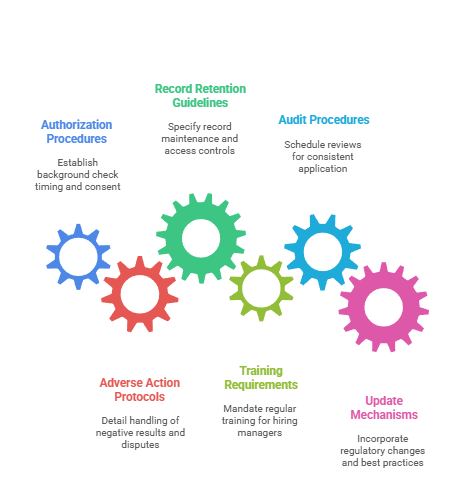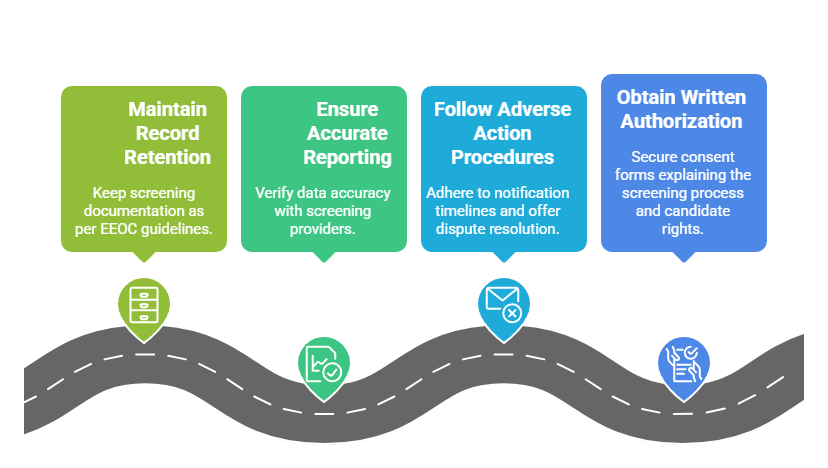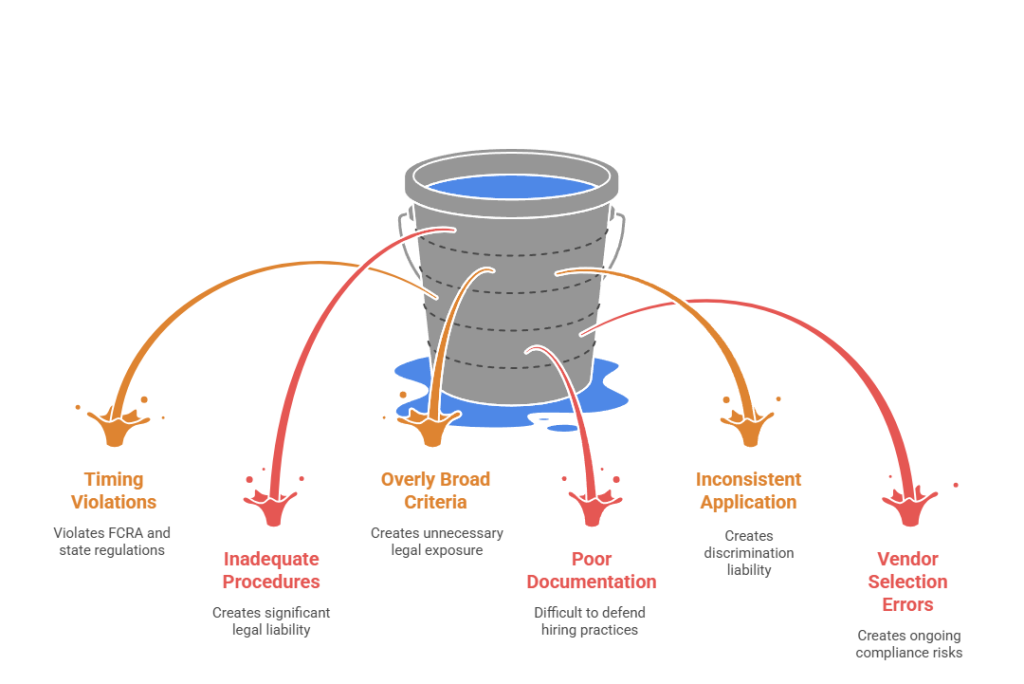Arizona small businesses must navigate specific state regulations and federal compliance requirements when conducting employee background checks, with costs typically ranging from $25-150 per screening depending on the depth of investigation required. Implementing a comprehensive Arizona pre-employment screening process protects businesses from negligent hiring liability while ensuring fair and legal hiring practices.
Key Takeaways
- Arizona small business background checks require compliance with both federal FCRA regulations and state-specific laws regarding criminal history inquiries and reporting timelines.
- Employment screening costs vary significantly based on industry requirements, with basic checks starting at $25 and comprehensive screenings reaching $150 per candidate.
- Small business hiring background policies must include written authorization, adverse action procedures, and specific timelines for candidate notification.
- Different industries face varying regulatory requirements, with healthcare and financial services requiring more extensive Arizona pre-employment screening protocols.
- Proper documentation and consistent application of screening policies across all candidates helps protect against discrimination claims and legal challenges.
- Partnering with FCRA-compliant screening providers reduces administrative burden while ensuring small business hiring compliance with evolving regulations.
Understanding Arizona Employment Screening Laws
Arizona operates as an "at-will" employment state. However, this doesn't eliminate the legal requirements surrounding background screening processes. The state follows federal Fair Credit Reporting Act (FCRA) guidelines. Additionally, it maintains specific provisions that affect how small businesses conduct pre-employment investigations. Arizona law prohibits inquiries about arrests that didn't result in convictions. Notably, exceptions exist for positions involving security or financial responsibilities.
Small businesses must understand that Arizona revised its "Ban the Box" legislation. This law restricts when criminal history questions can be asked during the hiring process. Employers cannot inquire about criminal records on initial job applications. Nevertheless, they may conduct background checks after making a conditional job offer. This timing requirement significantly impacts small business hiring compliance procedures. Furthermore, it requires careful coordination with screening vendors.
The Arizona Civil Rights Division enforces employment discrimination laws that intersect with background screening practices. Companies must ensure their Arizona small business background checks don't disproportionately impact protected classes. Moreover, they must maintain consistent screening criteria across all positions. Documentation becomes crucial for demonstrating fair hiring practices. It also helps defend against potential discrimination claims.
Arizona also maintains specific recordkeeping requirements for employment screening. Businesses must retain screening documentation for prescribed periods. Additionally, they must provide access to candidates upon request. These requirements align with federal standards but include state-specific notification timelines. Compliance with these provisions protects businesses from regulatory violations.
Types of Background Checks for Small Businesses
Criminal History Verification
Criminal background checks represent the most common component of Arizona pre-employment screening programs. These searches can include county-level records, state repositories, and federal databases. The scope depends on the position's requirements and associated risks. Small businesses must balance thoroughness with cost-effectiveness. Furthermore, they must ensure compliance with reporting limitations.
Arizona Criminal Check Options:
| Check Type | Coverage | Typical Cost | Processing Time |
| County Criminal | Single county records | $15-25 | 1-2 business days |
| Statewide Criminal | Arizona state database | $25-35 | 2-3 business days |
| Multi-State Criminal | Multiple state searches | $40-60 | 3-5 business days |
| Federal Criminal | Federal court records | $30-45 | 2-4 business days |
Most employment screening providers recommend combining county and state-level searches for comprehensive coverage. Federal searches become necessary for positions involving government contracts or regulated industries. Each type of search provides different levels of coverage and accuracy.
Employment and Education Verification
Reference and credential verification helps validate candidate qualifications and work history accuracy. Arizona small businesses should verify employment dates, job titles, and reasons for leaving previous positions. This process helps identify potential red flags or misrepresentations. Educational verification confirms degrees, certifications, and professional licenses relevant to job requirements.
Employment verification typically costs $15-25 per reference. It requires 2-4 business days for completion. Education verification ranges from $20-40 per institution. Professional license checks add $10-20 per credential. These verification steps prove particularly valuable for positions requiring specific qualifications. They also help with technical expertise validation.
Credit and Financial Background Checks
Financial background screening applies primarily to positions involving money handling. It's also relevant for roles with financial decision-making authority. Additionally, it covers access to sensitive financial information. Arizona follows federal restrictions on credit check usage. This requires clear business justification and candidate authorization. Small businesses must demonstrate job-relatedness when including credit reports in their screening protocols.
Credit-based employment screening costs range from $25-40 per candidate. It provides insights into financial responsibility and potential fraud risks. However, businesses must consider the Fair Credit Reporting Act's adverse action requirements. They must also provide appropriate notifications when credit information influences hiring decisions.
Drug Testing and Medical Screening
Drug testing forms another component of comprehensive background screening programs. Arizona allows pre-employment drug testing with proper candidate notification. However, businesses must follow specific procedures for collecting and analyzing samples. Medical examinations can only occur after conditional job offers. Furthermore, they must relate directly to essential job functions.
Drug screening costs typically range from $30-75 per test. The price varies based on the substances tested and collection methods. Medical examinations cost significantly more and require specialized healthcare providers. These screenings prove essential for safety-sensitive positions and regulated industries.
Industry-Specific Background Screening Requirements
Different small business sectors face varying regulatory requirements and risk profiles. These factors influence their Arizona pre-employment screening approaches. Understanding industry-specific needs helps optimize screening investments. Moreover, it maintains compliance with sector regulations. The following considerations apply across key Arizona small business industries.
Healthcare organizations face the most stringent screening requirements. They must conduct criminal background checks on all employees. Additionally, they need professional license verification and reference checks. The Arizona Department of Health Services oversees these requirements. Costs typically range from $75-125 per candidate. Mandatory reporting requirements add complexity to the screening process.
Financial services companies must comply with federal banking regulations. These mandate comprehensive screening protocols and regular updates. FINRA and state banking authorities provide oversight. Screening costs range from $85-150 per candidate. Enhanced due diligence standards apply to all financial industry positions.
Industry-Specific Requirements:

- Childcare/Education: Criminal background checks, reference verification, and fingerprinting are required. The Arizona Department of Education oversees compliance. Central Registry checks are mandatory for all positions.
- Transportation: DOT compliance mandates criminal checks, motor vehicle records, and drug testing. The Arizona Department of Transportation provides regulatory oversight. Ongoing monitoring requirements apply to commercial drivers.
- Construction: Contractor license verification, criminal checks, and workers' compensation history reviews are standard. The Arizona Registrar of Contractors oversees industry requirements. Safety-sensitive positions require additional screening.
- Retail/Hospitality: Criminal background checks and employment verification focus on theft and violence prevention. General business licensing requirements apply. Costs remain lower than regulated industries.
Each industry maintains specific timelines for completing background checks. Additionally, they have unique requirements for ongoing monitoring and re-screening of existing employees.
Developing Small Business Hiring Background Policies

Creating comprehensive background screening policies protects Arizona small businesses from legal challenges. It also establishes consistent hiring practices. Written policies should outline screening procedures and job-relevant criteria. Furthermore, they must include candidate notification processes. Clear documentation demonstrates good faith efforts to comply with employment laws. It also provides defense against discrimination claims.
Effective policies begin with position-specific screening requirements. Businesses should define which positions require background checks. They must also specify the types of screening appropriate for each role category. This approach ensures proportional screening based on job responsibilities. It also helps control costs while maintaining appropriate risk management.
Essential Policy Components:

- Authorization procedures: Establish when background checks occur in the hiring process and ensure proper candidate consent documentation.
- Adverse action protocols: Detail the process for handling negative background check results, including candidate notification and dispute resolution opportunities.
- Record retention guidelines: Specify how long screening records are maintained and establish access controls for sensitive candidate information.
- Training requirements: Mandate regular training for hiring managers on policy implementation and legal compliance obligations.
- Audit procedures: Schedule regular reviews to ensure consistent application and identify potential improvement areas.
- Update mechanisms: Establish processes for incorporating regulatory changes and industry best practice developments into existing policies.
Regular policy reviews help identify potential gaps and ensure continued adherence to established procedures. Training programs keep hiring managers current with evolving regulations. Consistent application across all candidates prevents discrimination claims and maintains screening program integrity.
Employment Screening Costs and Budget Planning
Arizona small business background checks involve various cost components that impact hiring budgets. Understanding pricing structures helps businesses optimize their screening investments. Most screening providers offer package deals that reduce per-check costs. These comprehensive programs maintain appropriate risk management standards.
Basic criminal background checks typically cost $25-45 per candidate. Comprehensive packages include employment verification, education checks, and reference validation. These range from $75-150 per screening. Additional specialized searches add costs but provide enhanced protection. Motor vehicle records, credit reports, and professional license verification each add $15-40 per component.
Cost Management Strategies:
- Volume discounts: Negotiate reduced per-screening costs based on annual hiring projections and establish preferred provider relationships.
- Tiered screening: Implement different screening levels based on position risk and responsibilities to optimize resource allocation.
- Technology integration: Utilize screening platforms that integrate with existing HR systems to reduce administrative costs and processing time.
- Bulk purchasing: Consider annual contracts or prepaid screening credits to secure favorable pricing and budget predictability.
Small businesses should factor screening costs into their cost-per-hire calculations. The investment in thorough background checking often pays for itself. Benefits include reduced turnover, improved workplace safety, and protection from negligent hiring claims. Annual budget planning should include provisions for screening cost increases and program expansions.
Employment screening costs also vary based on geographic location within Arizona. Urban areas may have higher costs due to increased demand. Rural areas might face longer processing times due to limited court access. These factors should influence vendor selection and budget planning decisions.
Working with Background Screening Providers
Selecting appropriate screening vendors significantly impacts the success of Arizona small business background check programs. FCRA-compliant providers offer essential legal protections. They also streamline administrative processes through technology integration. Automated workflows improve efficiency and reduce manual errors. Due diligence in provider selection prevents compliance issues and ensures reliable service delivery.
Provider evaluation should begin with compliance verification. Businesses must confirm FCRA certification and professional accreditation. The Professional Background Screening Association (PBSA) provides industry standards. Additionally, providers should maintain appropriate insurance coverage. They must also demonstrate ongoing compliance training and updates.
Technology Integration Capabilities:
- Applicant tracking system compatibility: Seamless integration reduces data entry and improves candidate experience through automated workflows.
- Mobile-friendly portals: Candidate self-service options expedite the screening process and reduce administrative burden on HR staff.
- Real-time status updates: Automated notifications keep hiring managers informed of screening progress and completion status.
- Compliance monitoring: Built-in safeguards ensure proper authorization, timing, and adverse action procedures are followed consistently.
Established screening providers often offer compliance training and policy template resources. They also provide ongoing support for regulatory updates. These value-added services prove particularly valuable for small businesses. Many lack dedicated human resources staff or legal expertise in employment law compliance.
Service level agreements should specify turnaround times and accuracy guarantees. Providers should offer customer service support and dispute resolution procedures. Additionally, they must maintain data security standards and provide regular reporting capabilities.
FCRA Compliance and Legal Requirements
The Fair Credit Reporting Act establishes federal standards for employment background screening. Arizona small businesses must comply with FCRA requirements regardless of company size. Violations can result in significant penalties and legal liability. Understanding these requirements protects businesses and ensures proper candidate treatment.
FCRA compliance begins with proper authorization procedures. Businesses must obtain written consent before conducting background checks. This authorization must appear on a standalone document. It cannot be buried within employment applications or other paperwork. Clear disclosure of screening intentions and candidate rights is mandatory.
FCRA Compliance Checklist:

- Written authorization: Obtain standalone consent forms that clearly explain the screening process and candidate rights under federal law.
- Adverse action procedures: Follow required notification timelines and provide candidates with dispute resolution opportunities and contact information.
- Accurate reporting: Ensure screening providers maintain current information and follow proper verification procedures for all reported data.
- Record retention: Maintain screening documentation according to EEOC guidelines and provide candidate access upon written request.
Adverse action procedures require specific notifications and waiting periods. Businesses must provide pre-adverse action notices when negative information might influence hiring decisions. Candidates receive copies of background reports and summaries of their rights. A reasonable waiting period allows for disputes before final decisions. Final adverse action notices complete the process with additional rights information.
Ongoing compliance requires regular policy reviews and staff training. FCRA requirements evolve through regulatory updates and court decisions. Businesses must stay current with these changes to maintain compliant screening programs.
Common Background Screening Mistakes to Avoid
Arizona small businesses frequently encounter compliance challenges due to common screening errors. Understanding these pitfalls helps organizations develop more effective hiring processes. Proactive mistake prevention saves both time and money. Additionally, it improves overall hiring outcomes and reduces legal exposure.
The most frequent error involves inconsistent application of screening criteria. Different candidates receive varying levels of screening based on subjective factors. This inconsistency creates discrimination liability and undermines hiring decisions. Businesses must apply identical screening standards to all candidates for similar positions. Personal characteristics and hiring manager preferences cannot influence screening decisions.
Critical Compliance Mistakes:

- Timing violations: Conducting background checks before receiving proper authorization violates FCRA requirements and state regulations.
- Inadequate adverse action procedures: Missing notification requirements, waiting periods, and dispute resolution opportunities creates significant legal liability.
- Overly broad screening criteria: Including factors unrelated to job performance creates unnecessary legal exposure and poor candidate experiences.
- Poor documentation: Inadequate records make it difficult to defend hiring practices during legal challenges or regulatory investigations.
- Inconsistent policy application: Varying screening standards across similar positions or candidate groups creates discrimination liability.
- Vendor selection errors: Working with non-compliant providers transfers liability to the employer and creates ongoing compliance risks.
Documentation proves crucial for demonstrating compliance efforts and supporting hiring decisions. Regular training updates help hiring managers stay current with evolving regulations. Consistent screening practices maintain program integrity and protect against legal challenges.
Technology solutions can help prevent many common mistakes. Automated workflows ensure proper authorization and timing. Built-in compliance checks prevent policy violations. Regular system updates incorporate regulatory changes automatically.
Implementing Screening Technology Solutions
Modern background screening relies heavily on technology integration to improve efficiency and ensure compliance. Arizona small businesses benefit from automated systems that streamline the screening process. These solutions reduce administrative burden while maintaining accuracy and legal compliance. Technology integration also improves the candidate experience through faster processing and better communication.
Applicant tracking system integration provides seamless workflow management. Hiring managers can initiate background checks directly from candidate profiles. Status updates appear automatically within existing HR systems. This integration eliminates duplicate data entry and reduces processing errors. Additionally, it maintains complete audit trails for compliance purposes.
Technology Implementation Benefits:
- Automated compliance: Built-in safeguards ensure proper authorization, timing, and notification procedures are followed consistently.
- Faster processing: Direct integration eliminates manual steps and reduces screening turnaround times significantly.
- Better candidate experience: Self-service portals allow candidates to complete screening requirements at their convenience.
- Enhanced reporting: Real-time dashboards provide visibility into screening metrics and compliance status across all hiring activities.
- Cost reduction: Reduced administrative time and improved efficiency lower the total cost of screening operations.
Mobile-friendly solutions accommodate today's workforce expectations. Candidates can complete authorization forms and provide required information through smartphones. This convenience speeds up the screening process and improves completion rates. Modern solutions also provide multilingual support for diverse candidate populations.
Cloud-based screening platforms offer scalability for growing businesses. They provide enterprise-level security without requiring significant IT investments. Regular updates ensure ongoing compliance with changing regulations. Additionally, cloud solutions offer disaster recovery and data backup capabilities.
Conclusion
Arizona small business background checks require careful navigation of federal and state regulations while balancing cost considerations with risk management needs. Successful screening programs combine comprehensive policies, reliable provider partnerships, and consistent implementation across all hiring decisions. Technology integration streamlines processes and ensures compliance with evolving legal requirements. Small businesses that invest in proper background screening infrastructure protect themselves from negligent hiring liability while building stronger, more reliable teams. Regular policy reviews and compliance updates ensure continued effectiveness as regulations and business needs evolve.
Frequently Asked Questions
How long do Arizona small businesses need to keep background check records?
Arizona small businesses should retain background check records for at least three years after the hiring decision, following EEOC guidelines. However, many employment lawyers recommend keeping records for seven years to protect against potential discrimination claims and provide documentation for unemployment or workers' compensation disputes.
Can Arizona small businesses check criminal history for all positions?
Yes, but Arizona businesses must wait until after making a conditional job offer due to "Ban the Box" legislation. Criminal history inquiries must be job-related and consider factors like the nature of the crime, time elapsed, and position responsibilities. Blanket exclusions for all criminal history are discouraged and may create discrimination liability.
What's the average cost for comprehensive Arizona pre-employment screening?
Comprehensive background screening for Arizona small businesses typically costs $75-150 per candidate, including criminal history, employment verification, and reference checks. Basic criminal-only checks start around $25-45, while specialized industries like healthcare or finance may require additional screenings that increase total costs.
Do Arizona small businesses need candidate permission for background checks?
Yes, Arizona small businesses must obtain written authorization before conducting any background checks under FCRA requirements. This authorization should be on a standalone document, clearly explain the screening process, and include candidate acknowledgment of their rights under federal and state law.
How quickly can Arizona small business background checks be completed?
Most Arizona small business background checks are completed within 2-5 business days, depending on the scope of screening and information availability. County criminal searches typically take 1-2 days, while employment verification and education checks may require 3-5 days due to third-party response times.
What happens if a background check reveals negative information in Arizona?
Arizona businesses must follow FCRA adverse action procedures, including providing pre-adverse action notices, waiting periods for candidate response, and final adverse action notifications. Candidates have the right to dispute inaccurate information and receive copies of background check reports that influenced hiring decisions.
Additional Resources
- Arizona Attorney General's Office - Fair Credit Reporting Act Guide
https://www.azag.gov/consumer/credit/fcra - Professional Background Screening Association (PBSA) - Small Business Resources
https://www.professionalbackground.org/small-business - Arizona Small Business Association - Employment Law Compliance
https://www.asba.com/employment-compliance - EEOC Enforcement Guidance on Criminal Records in Employment Decisions
https://www.eeoc.gov/laws/guidance/arrest_conviction.cfm - Arizona Department of Economic Security - Employer Resources
https://des.az.gov/services/employment/employer-resources - Society for Human Resource Management (SHRM) - Background Screening
https://www.shrm.org/resourcesandtools/hr-topics/talent-acquisition/pages/background-screening.aspx
